Community Engaged Learning starts with a conversation
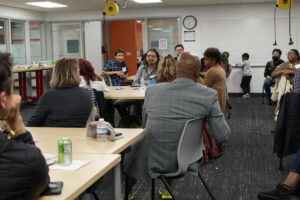 Our vision of Community Engaged Learning, an evolution of Project Based Learning for K-12, recognizes a role for both near-peer mentors and industry mentors. This essential role supports and coaches students over the course of the projects they take on. We believe that there’s a big difference between simply having folks show up at a school, and inviting them to play an effective role in the process for students and teachers. It is so important in our view that we decided to kick off our 7th season of Collab Labs at MSOE’s STEM Center last Thursday with a discussion focused on the roles of mentors, what successful mentoring looks like, and what it takes to get there.
Our vision of Community Engaged Learning, an evolution of Project Based Learning for K-12, recognizes a role for both near-peer mentors and industry mentors. This essential role supports and coaches students over the course of the projects they take on. We believe that there’s a big difference between simply having folks show up at a school, and inviting them to play an effective role in the process for students and teachers. It is so important in our view that we decided to kick off our 7th season of Collab Labs at MSOE’s STEM Center last Thursday with a discussion focused on the roles of mentors, what successful mentoring looks like, and what it takes to get there.
Participants included K-12 educators, professionals engaged in mentoring, or working with organizations that provide or support mentors, or engage with schools in other ways. We were also glad to welcome additional community members in a joint effort with Foureva Media’s to use the Collab Lab as their Foureva Movement’s October meetup. By chance or circumstance, the group included several mentor/mentee pairs, who were able to provide additional meaning for the discussion.
Personal experience
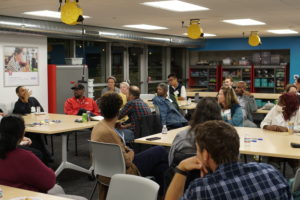 We began the evening with a discussion of participants’ own experiences with, or as a mentor, and what they took away from that involvement. We’re not surprised anymore that our ‘kitchen table format’ consistently enables attendees to ‘go deep’ within 15 minutes of sitting down with complete strangers. Our participants observed:
We began the evening with a discussion of participants’ own experiences with, or as a mentor, and what they took away from that involvement. We’re not surprised anymore that our ‘kitchen table format’ consistently enables attendees to ‘go deep’ within 15 minutes of sitting down with complete strangers. Our participants observed:
- There’s a gatekeeping role in terms of who has access to support students
- Systemic racism impacts who has access to mentors, who mentors are willing to serve, and expectations about how those relationships should occur
- The role of the teacher is different than that of mentors, and an outside mentors can often motivate students in ways a teacher cannot
- The continuity of mentor/mentee relationships can anchor students who might otherwise have disconnected relationships with family
- Mentors can provide the confidence students need to push through challenges
- Time is a limited resource, so we need to look for relationships that can offer the maximum impact within those constraints
- Stats show: People who’ve had mentors are more likely to take leadership roles
- Definitions of mentoring vary, but what is key is the mentor/mentee relationship
- A young person needs to trust a mentor as a friend
- Mentors need to be able to listen
- Mentors can empower students by giving them a voice
- Mentors need to be open to “accepting the call” from a student
- Barriers between the community and school get in the way of mentorship opportunities
Goals for Mentors and Students
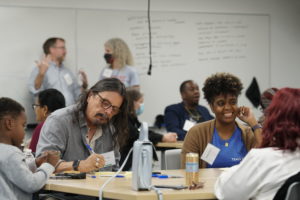 With this as context, we asked participants to capture what they see as the goals behind building mentor/mentee relationships with students. We ask this not just from the perspective of what we want for students, but what we hope mentors gain from the experience.
With this as context, we asked participants to capture what they see as the goals behind building mentor/mentee relationships with students. We ask this not just from the perspective of what we want for students, but what we hope mentors gain from the experience.
For students, we hope for:
Support
- I want students to see how to be there for yourself
- I want students to feel heard, empowered
- I want students to see “professional interaction, and learn to function as a group to build each other up, solve problems, and change the world
- I want students to feel like they are not alone, that they are supported and wanted
- I want students to feel loved and that people care about them
- I want students to have access to supports they may not have at home
Acceptance/Validation
- I want students to feel freedom of exploration
- I want students to see its ok to be a little different
- I want them to experience their own ideas in real life
- I want students to feel included
- I want students to feel comfortable
- I want students to feel that they matter and they can create a future beyond where they may be now
Variety
- I want students to experience different opportunities that spark their curiosity
- I want students to see other role models, learn STEM and life skills
- Diversity in thought
- I want students to experience life outside of central Milwaukee
- I want students to experience representation for all/diversity
Perspective
- I want students to experience a different viewpoint
- I want students to see someone close in age
- I want students to see other avenues to be successful
- I want students to see personality
Inspiration/Resilience
- I want students to see what’s possible, that they can do anything
- I want students to see the opportunities available to them to be successful
- I want students to feel excited, encouraged, heard
- I want students to experience success
- Bring something different out of them
- I want students to experience opportunities for curiosity
- I want students to see a path forward without telling them explicitly– questions and guidance
- I want students to be curious, to experience opportunities that challenge, and push themselves to think critically and learn new perspectives
- I want students to experience what they can be outside of what they typically experience
Real Life
- I want students to see people/adults with similar backgrounds and experiences doing what they’ve dreamed (or just thought) of doing
- I want students to experience every day living
- I want students and mentors to see the humanness/the light in each other
- I want students to experience real life/hands on personal growth/learning
- I want students to learn social responsibility and critical thinking
- I want mentors to feel an emotional rush/connection
For mentors, we hope for:
Fulfillment
- I want mentors to feel they are making a difference
- I want mentors to feel a connection
- I want mentors to experience the joy of young people, to see their success and personal growth, to learn from students
- I want mentors to feel that their time invested in you makes a difference
- I want mentors to view mentorship as part of their legacy
- I want mentors to feel capable, confident, energized, that they grow through the experience
- I want mentors to experience the confidence that they have helped build.
- I want mentors to see transformation in a mentee, to experience the feeling of impacting some else’s life, to feel like they made a difference
- I want mentors to see the civic and social potential of their professional lives
- I want mentors to see that they are part of how to change the community in a positive way
- I want mentors to experience their impact, to feel empowered, to see how excited students are
Perspective
- I want mentors to overcome the perception of the characteristics of a mentor
- I want mentors to understand the purpose of mentoring
- I want mentors to understand that mentorship is for all
- I want mentors to understand what these relationships do for society
- I want mentors to be in students lives as a way to show them things they may not always see
- I want mentors to ask questions
- I want mentors to see the advantages/disadvantages young people bring with them
- I want mentors to see the path that a student didn’t see, to look beyond behavior and learn from each other
- I want mentors to see difference as a positive
- I want mentors to experience the day of student, and how they function with the peer pressure of today’s students
Understanding
- I want mentors to understand the greatness of kids
- I want mentors to see how awesome our kids are, what students can do, and that students are people, not stereotypes
- I want mentors to see that it is not always about instruction, but helping students see a path forward
- I want mentors to share their own experiences
- I want mentors to see that students can do better, they can be taught, they do listen, they do want more
- I want mentors to broaden their own understanding
- I want mentors to continue their own learning about other cultures/experiences
- I want mentors to build empathy for what children are going through today
- I want mentors to increase their global competency and cultural awareness
Visions for mentoring
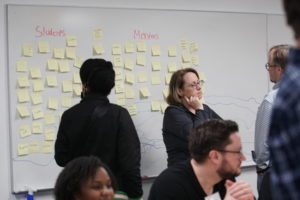 From this broad set of goals for students and mentors we asked each discussion group to pick a couple of key goals and create a vision for what a successful mentoring relationship looks like. Here’s what they came up with:
From this broad set of goals for students and mentors we asked each discussion group to pick a couple of key goals and create a vision for what a successful mentoring relationship looks like. Here’s what they came up with:
Table 1
Key goals: To have the experience be authentic for both sides
We know we’re on the right track when we see: Vulnerability, empathy, discourse, engagement
For that we need: A safe environment and clarity on expectations and outcomes
We’ve seen this done well within: Higher Ed programs, Big Brothers/Big Sisters, Wehr Nature Center, Owen’s Place
Table 2
Key goals: Relationship building, showing up, asking questions, relatable
We know we’re on the right track when we see: Balanced interaction, students start conversations
For that we need: Delivery expectations, time to build relationships, trust, and understand diverse ideas
We’ve seen this done well within: Milwaukee Robotics Academy
Table 3
Key goals: Ensuring proper support for mentors; Mentors as a learning support for students
We know we’re on the right track when we see: Mentors are confident with their group and able to interact well; Students are able to use what they learn to drive their success
For that we need: Pathways to connect mentors with schools or a plant to make connections through workshops or conferences; There must be someone in the school who is dedicated to networking– parent coordinator or Assistant Principal; Connect to higher-ed or just one company
Table 4
Key goals: Get to know the students, feeling of safety, shared goals from mentor/mentee
We know we’re on the right track when we see: Everyone feels heard/valued “I see you”; building trust, especially at the beginning
For that we need: Mentors understand boundaries (do’s and don’ts); knowledge; training; a willingness to let go of control; authentically want to be a mentor
Table 5
Key goals: Connections
We know we’re on the right track when we see: Through communications, networking, commitment
For that we need: To build trust, connect mentors & mentees, have a common goal, commitment, networking
We’ve seen this done well within: Glenn Hills Middle School/other public schools; Engineers without Borders; Habitat for Humanity; Peace Corps.
What’s next?
After reading the insightful contributions from the Collab Lab participants above, you might ask yourself: So where does this go from here?
Join us Thursday, October 27th from 4:30 to 5:30 on Zoom for a follow up conversation. We want to talk through what you heard, what you’d like to act on, and explore how we can lay the groundwork to do so. RSVP
Acknowledgements
We are especially grateful to our featured participants for the experience and insight they brought to the discussion:
- Kahina Cargile – Regional Manager, Microsoft TEALS
- Nate Deans Jr – Director of Black and Latino Male Achievement, Milwaukee Public Schools
- Erik Lee – Senior Solutions Design Lead, Harley Davidson Motor Company; FIRST Robotics Mentor, Milwaukee Robotics Academy
- LaNelle Ramey, M.A. – Executive Director, MENTOR Greater Milwaukee
- Dr. Michael Sevier – Chair for Servant-Leadership, MSOE
- Ben Trager – Interim Director, UWM Center for Community-Based Learning, Leadership, and Research
- Jamar Jones – Owner, Foureva Media
Thanks again to MSOE’s STEM Center for hosting our Collab Lab series this season.
Be part of the Conversation
If you like the topics we select every month and would like to be part of the conversation, we invite you to join us next time for Collab Lab 50 (RSVP) when we explore how we can incorporate the notion of Community Engaged Science into the student learning experience.
 Collab Lab 54 explored issues around youth mental health and violence. One of our largest groups to date, which included middle and high school student leaders, focused on factors that impact the degree to which students and teachers feel safe and affirmed at school. Matt Nink and Vanessa Rodriguez from SKY Schools kicked things off for us with a mindfulness exercise, after which we dove into the discussion.
Collab Lab 54 explored issues around youth mental health and violence. One of our largest groups to date, which included middle and high school student leaders, focused on factors that impact the degree to which students and teachers feel safe and affirmed at school. Matt Nink and Vanessa Rodriguez from SKY Schools kicked things off for us with a mindfulness exercise, after which we dove into the discussion.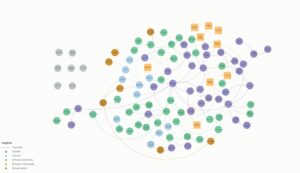 The output of those conservations was a long list of interrelated factors, and some initial thoughts on how those influence each other. We pulled those factors into the first draft of a system map. If you’re not familiar with a system map, each of the factors identified in the Collab Lab is represented as a node. Solid arrows connecting two nodes indicate that an increase in the factor represented by the first node leads to an increase in the factor represented by the second node. A dashed line indicates a negative relationship between nodes.
The output of those conservations was a long list of interrelated factors, and some initial thoughts on how those influence each other. We pulled those factors into the first draft of a system map. If you’re not familiar with a system map, each of the factors identified in the Collab Lab is represented as a node. Solid arrows connecting two nodes indicate that an increase in the factor represented by the first node leads to an increase in the factor represented by the second node. A dashed line indicates a negative relationship between nodes. 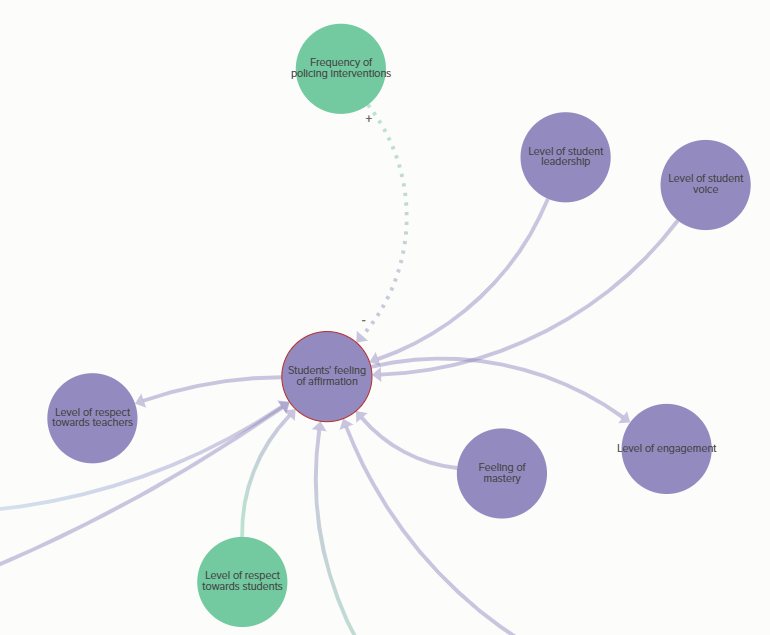

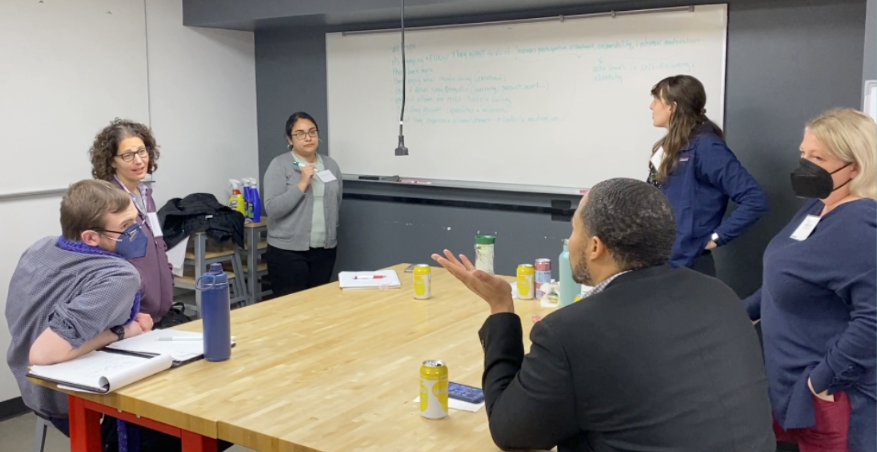
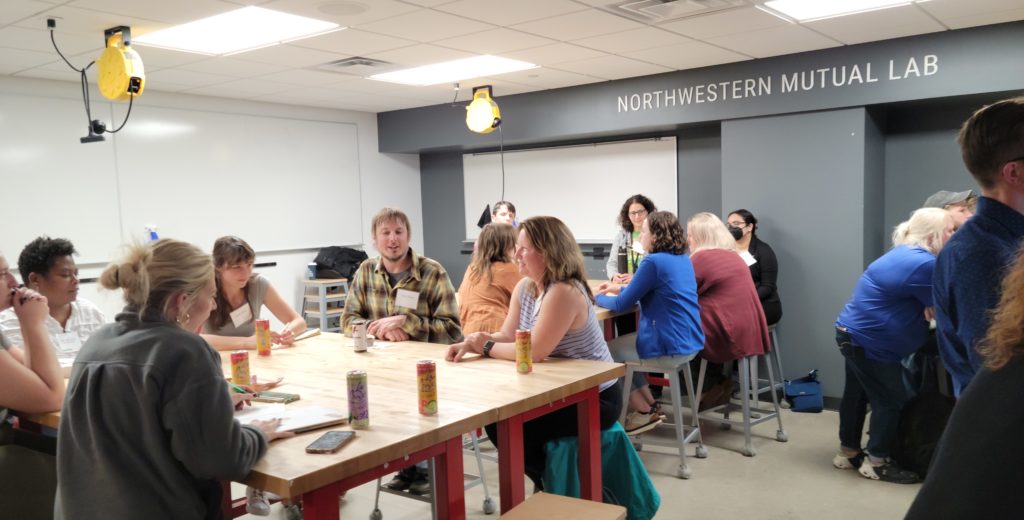
 Our vision of Community Engaged Learning, an evolution of Project Based Learning for K-12, recognizes a role for both near-peer mentors and industry mentors. This essential role supports and coaches students over the course of the projects they take on. We believe that there’s a big difference between simply having folks show up at a school, and inviting them to play an effective role in the process for students and teachers. It is so important in our view that we decided to kick off our 7th season of
Our vision of Community Engaged Learning, an evolution of Project Based Learning for K-12, recognizes a role for both near-peer mentors and industry mentors. This essential role supports and coaches students over the course of the projects they take on. We believe that there’s a big difference between simply having folks show up at a school, and inviting them to play an effective role in the process for students and teachers. It is so important in our view that we decided to kick off our 7th season of  We began the evening with a discussion of participants’ own experiences with, or as a mentor, and what they took away from that involvement. We’re not surprised anymore that our ‘kitchen table format’ consistently enables attendees to ‘go deep’ within 15 minutes of sitting down with complete strangers. Our participants observed:
We began the evening with a discussion of participants’ own experiences with, or as a mentor, and what they took away from that involvement. We’re not surprised anymore that our ‘kitchen table format’ consistently enables attendees to ‘go deep’ within 15 minutes of sitting down with complete strangers. Our participants observed: With this as context, we asked participants to capture what they see as the goals behind building mentor/mentee relationships with students. We ask this not just from the perspective of what we want for students, but what we hope mentors gain from the experience.
With this as context, we asked participants to capture what they see as the goals behind building mentor/mentee relationships with students. We ask this not just from the perspective of what we want for students, but what we hope mentors gain from the experience. From this broad set of goals for students and mentors we asked each discussion group to pick a couple of key goals and create a vision for what a successful mentoring relationship looks like. Here’s what they came up with:
From this broad set of goals for students and mentors we asked each discussion group to pick a couple of key goals and create a vision for what a successful mentoring relationship looks like. Here’s what they came up with:
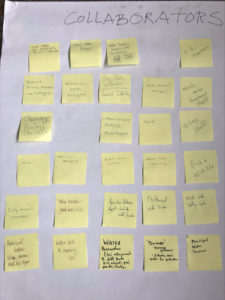
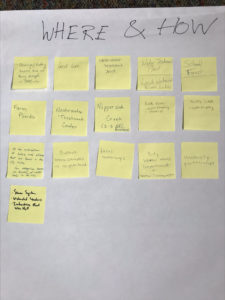
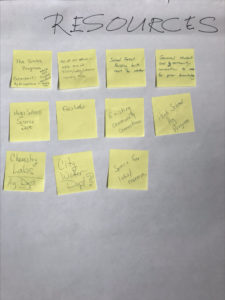
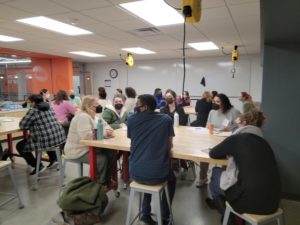 Start with the end in mind
Start with the end in mind
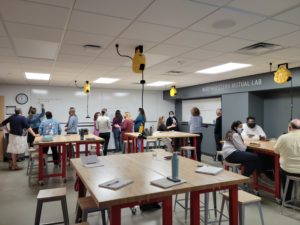 We kicked off our 6th season of
We kicked off our 6th season of 